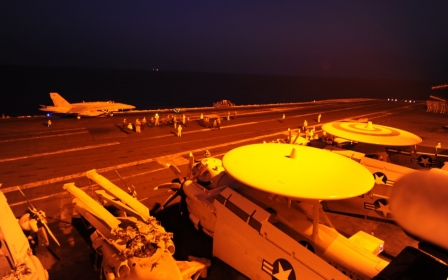Pentagon says 'Khorasan group' leader killed in Syria airstrike

The leader of a group of Al-Qaeda veterans which Washington calls the "Khorasan group" has been killed in a coalition airstrike in Syria, the Pentagon said on Sunday.
Sanafi al-Nasr, a Saudi national also known as Abdul Mohsen Abdullah Ibrahim al-Sharikh, was killed in an air attack in the northwest of the country Thursday, it said.
"This operation deals a significant blow to the Khorasan group's plans to attack the United States and our allies," Secretary of Defense Ash Carter said in a statement.
Syrian Observatory for Human Rights, a Britain-based monitoring group, had reported al-Nasr's death on Friday, saying he was killed in a strike in Aleppo province.
Al-Nasr was listed as a "specially designated global terrorist" by the US Treasury Department in 2014. He had been erroneously reported dead in the past.
"The United States will not relent in its mission to degrade, disrupt and destroy Al-Qaeda and its remnants," added Carter.
The Pentagon described al-Nasr as a "long-time jihadist" who funnelled money and fighters for Al-Qaeda and said he was the fifth senior Khorasan gtroup leader killed in the last four months.
Some, however, claim the Khorasan Group doesn't exist.
A spokesperson for Al-Qaeda's affiliate in Syria, al-Nusra Front, told Al Jazeera Arabic in May 2015: “The so-called Khorasan group, supposedly active within our ranks, doesn’t exist. We first heard about it via the media after the US-led coalition bombed us. It is merely a Western invention to justify the bombings on us. There are some brothers from Khorasan who joined our strife though.”
Stay informed with MEE's newsletters
Sign up to get the latest alerts, insights and analysis, starting with Turkey Unpacked
Middle East Eye delivers independent and unrivalled coverage and analysis of the Middle East, North Africa and beyond. To learn more about republishing this content and the associated fees, please fill out this form. More about MEE can be found here.




